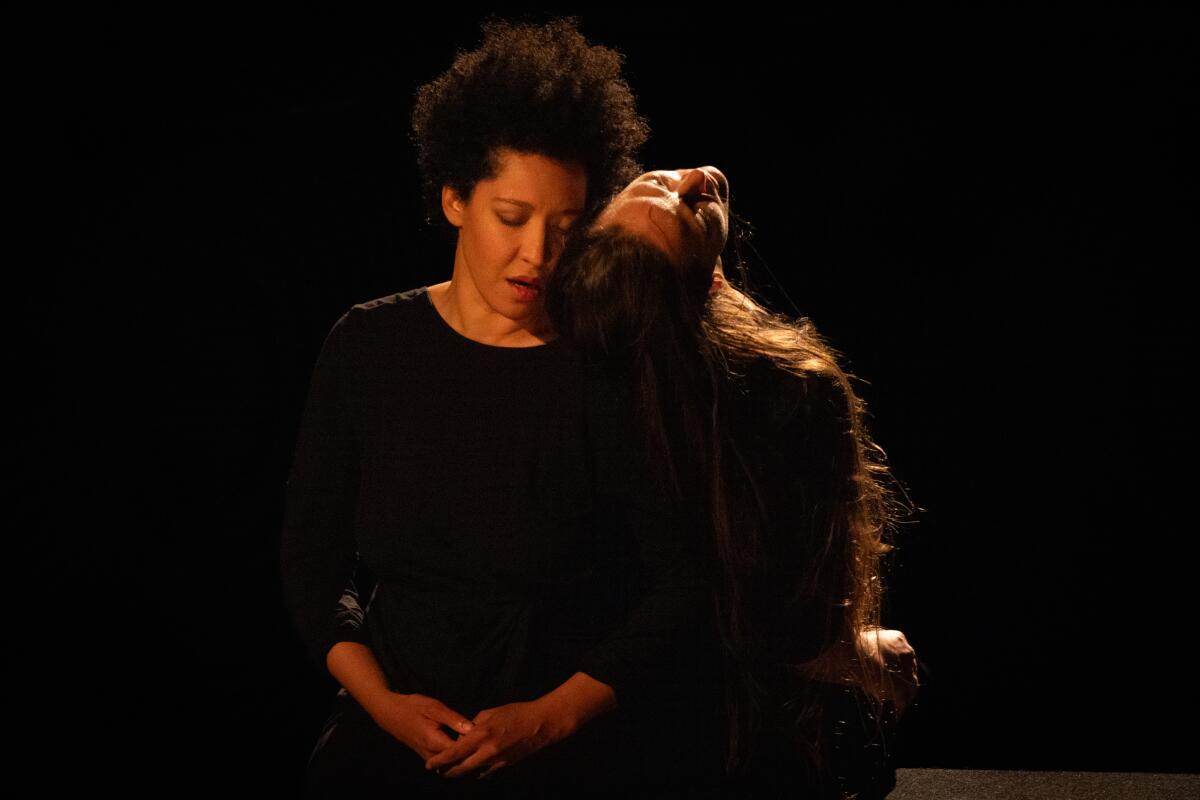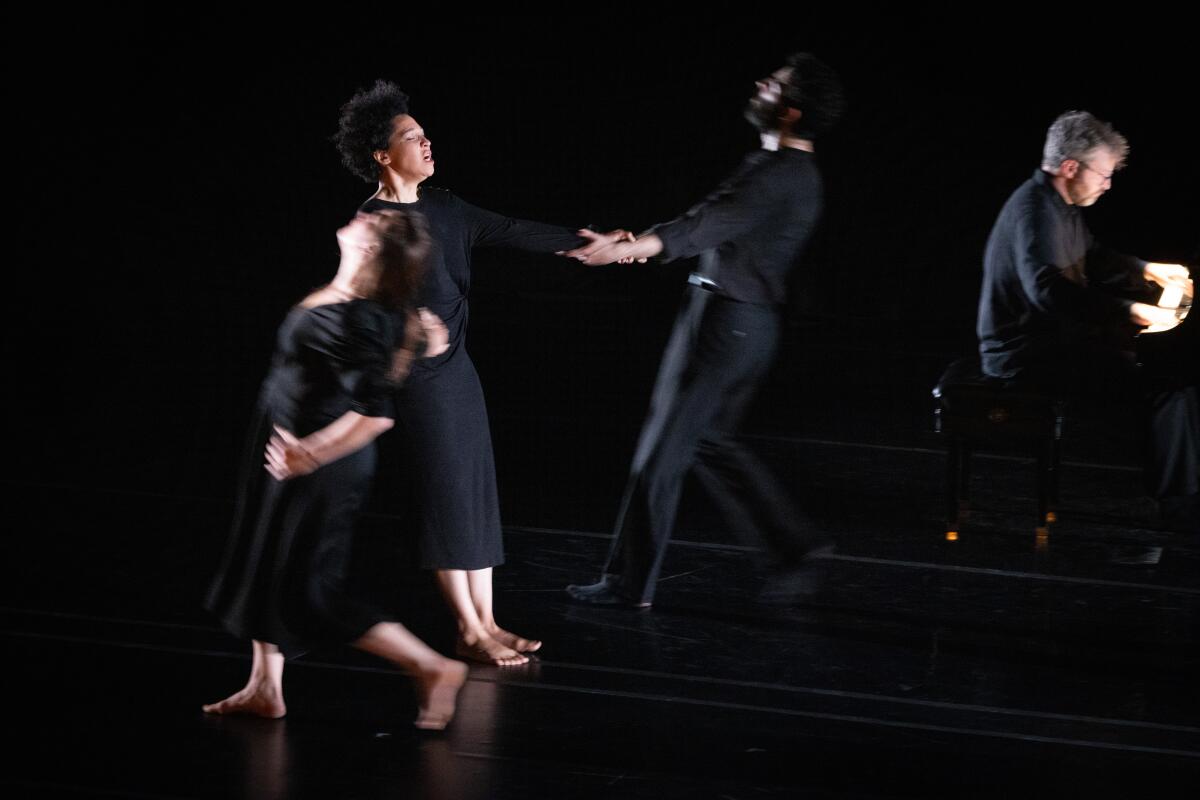Julia Bullock and Davone Tines, both 37, reinvent the old song recital for a new generation

- Share via
- Two leading singers of their generation center recitals on Paul Robeson and the Messiaen song cycle “Harawi.”
- The performances are nothing short of thrillingly transcendent.
The old-fashioned song (or Lieder) recital — a singer in formal attire stoically standing next to a grand piano delivering art songs in foreign languages, unamplified in a concert hall far too large for intimacy — has obviously long needed refreshing. Indeed, it has all but disappeared from American stages.
But enter Julia Bullock and Davóne Tines. Each came through town recently with a highly personal and revealing recital program of intense intimacy and theatrical originality, boldly proclaiming a new generation’s profound rebirth of the medium.
Bullock took a spectacular deep dive into a seldom-heard song cycle by Olivier Messiaen, an hour of agony and ecstasy full of obscurities about the European Tristan myth, using a French text peppered with Quechua, an indigenous South American language. Tines’ spectacular deep dive was into the magnificent 20th century Black singer, actor and activist Paul Robeson.
Los Angeles Opera opens its fall season with a production of Puccini’s “Madame Butterfly” that sets the story on a 1930s Hollywood film set.
Bullock and Tines are names that easily pair. They are the same age. They are Juilliard trained. They both came under director Peter Sellars’ wing early, and he gave them their first major exposure, particularly when he was music director of the 2016 Ojai Music Festival. About to turn 30, they displayed such a sense of life-force that they seemed certain to become the leading singers of their generation.
And so they are. Sellars brought them to John Adams’ attention, and they starred together, with brilliant theatrical verve, in his 2018 opera, “Girls of the Golden West,” a performance of which, recorded with the Los Angeles Philharmonic, was released this year on Nonesuch. Bullock’s first recital recording, “Walking in the Dark,” released on Nonesuch late in 2022, stunned the vocal world with its passion and won a Grammy. Tines now has his first Nonesuch recital recording, “Robeson,” just out, another Nonesuch knockout and obvious Grammy contender.
Bullock and Tines are also members of American Modern Opera Company, a collective of young artists in multiple fields reinventing opera. The AMOC production “Harawi” is directed by company co-founder Zack Winokur and features the company’s dancers Or Schraiber and Bobbi Jene Smith and pianist Conor Hanick. While not produced by AMOC, “Robeson” was conceived by Tines and Winokur, who commissioned it for his new summer festival on Manhattan’s Little Island in June.
The Ojai festival, where Bullock first performed as a student in 2011, was to have premiered “Harawi” in 2022, but that had to be canceled when Bullock contracted COVID-19. It has since triumphed at the Festival d’Aix-en-Provence before arriving Oct. 1 at the Wallis Annenberg Center for the Performing Arts in Beverly Hills (in collaboration with Ojai) and in Berkeley before that. Bullock said in a post-concert panel discussion that it’s been on her mind for some 15 years.
A lot has been made of the circumstances of Messiaen’s hourlong cycle, for which he wrote his own song texts. At the end of the Second World War, the French composer, who had been held for a year in a prisoner of war camp, found his wife had had a mental breakdown and was in declining health.
Shortly after, he fell in love with a young pianist and became obsessed with the Tristan myth, in whom love and death become existentially intertwined. In “Harawi,” he began to develop a new musical language. Strange and complicated rhythm structures and overheated harmonies, along with mystic bird calls in the piano all bespeak the magic of his young love.
But it is the singer who takes this to a new level, as she leaves one world and enters a spiritual new one. She becomes a new being without leaving the old one behind.

Bullock embodied all the contradictions of that spirit of love and death, and Hanick, the reality. The dancers — the electric leaping of Schraiber and enveloping movements of Smith — seconded this on a stage that was bare but for a bench and striking lighting. As the dozen songs progressed, Bullock, who is a sensual dancer, absorbed grief and joy, each emotion ever more intense. Each word, whether French or Quechuan, seemed to hold double meaning, so full-bodied was her vocal production. She made “Harawi” into a beauteous yet dark landmark of singing.
“Robeson” holds equally powerful personal meaning for Tines. But the structure of his 70-minute performance, which opened the Monday Evening Concert’s 85th season at the Colburn School’s Zipper Hall last month in downtown L.A., was more awkward. Instead of a pre- or post-performance discussion, he took breaks from performing numbers that Robeson made essential listening and joined Hamza Walker, the director of the nonprofit art space the Brick (formerly LAXArt), in unpacking the program.
In an interview from Salzburg, Gustavo Dudamel talks about what Los Angeles means to him and addresses the perception that he’s no longer focused on the city that launched his career.
The subtitle of “Robeson” is, in fact, “Unpacking a Classical Americana Electro-Gospel Acid Trip.” Throughout his career, Tines, who can hold the world in his hands like no other singer I know today, had been compared to Robeson, who was said to have done the same thing. But rather than be Robeson, Tines explained, his need has been to liberate himself from the great singer.
Tines started out Robeson-esque performing “Some Enchanted Evening,” speaking Othello’s final monologue and singing African American spirituals, becoming angrier and yet also more ecstatic as he progressed. “Lift Every Voice” rose to rapture. “Let it Shine” was the thrill of a lifetime, the actual embodiment in song of an acid trip, or maybe enlightenment. Only after reaching that height could he then find the grace to to make “Old Man River,” sung as a new hymn of somber inspiration, his epilogue, the acid trip’s final, meaningful passage.
All acid trips need spiritual guides. Tines had Khari Lucas, a multi-instrumental sound artist, and jazz pianist John Bitoy. With them, he created an inspiring new sound world, finding a new man river, which freed Tines to transcend Paul Robeson without eradicating him.
More to Read
The biggest entertainment stories
Get our big stories about Hollywood, film, television, music, arts, culture and more right in your inbox as soon as they publish.
You may occasionally receive promotional content from the Los Angeles Times.













